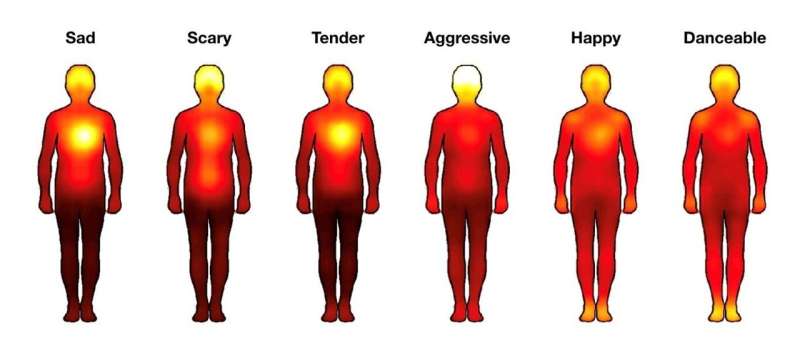This article has been reviewed according to Science X's editorial process and policies. Editors have highlighted the following attributes while ensuring the content's credibility:
fact-checked
peer-reviewed publication
trusted source
proofread
Music found to cause similar emotions and bodily sensations across cultures

A new study of the Turku PET Center in Finland has shown that music evokes similar emotions and bodily sensations around the world.
Music can be felt directly in the body. When we hear our favorite catchy song, we are overcome with the urge to move to the music. Music can activate our autonomic nervous system and even cause shivers down the spine. A new study from the Turku PET Center in Finland shows how emotional music evokes similar bodily sensations across cultures.
"Music that evoked different emotions, such as happiness, sadness or fear, caused different bodily sensations in our study. For example, happy and danceable music was felt in the arms and legs, while tender and sad music was felt in the chest area," explains Academy Research Fellow Vesa Putkinen.
The results of the study were published on 25 January 2024 in the Proceedings of the National Academy of Sciences.
The emotions and bodily sensations evoked by music were similar across Western and Asian listeners. The bodily sensations were also linked with the music-induced emotions.
"Certain acoustic features of music were associated with similar emotions in both Western and Asian listeners. Music with a clear beat was found happy and danceable while dissonance in music was associated with aggressiveness. Since these sensations are similar across different cultures, music-induced emotions are likely independent of culture and learning and based on inherited biological mechanisms," says Professor Lauri Nummenmaa.
"Music's influence on the body is universal. People move to music in all cultures and synchronized postures, movements and vocalizations are a universal sign for affiliation. Music may have emerged during the evolution of human species to promote social interaction and sense of community by synchronizing the bodies and emotions of the listeners," continues Putkinen.
The study was conducted in collaboration with Aalto University from Finland and the University of Electronic Science and Technology of China (UESTC) as an online questionnaire survey. Altogether 1,500 Western and Asian participants rated the emotions and bodily sensations evoked by Western and Asian songs.
More information: Vesa Putkinen et al, Bodily maps of musical sensations across cultures, Proceedings of the National Academy of Sciences (2024). DOI: 10.1073/pnas.2308859121
Journal information: Proceedings of the National Academy of Sciences
Provided by University of Turku




















